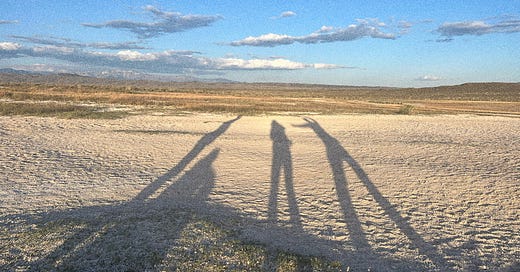My parents are in the mood to remember. We’re sitting at dinner, and everyone’s scooping food onto their plates. Pastas and salads and soft pink fish. This is when the stories pour out, the ones I’ve heard and the ones I can’t believe they’ve kept to themselves for so long. This time, they all have the same theme: the sweetness of forgetting.
My mom and dad retell the story of their early lives together. When they met, she owed a mountain of student debt. He paid it off for her, she says. Only my dad remembers the whole thing differently. He says that he covered their rent and bills so she could chisel away at her loans.
The details of the arrangement have receded into the place where memories go when they are no longer necessary. All they can recall for sure is that some agreement transformed a solo debt into a shared one, an unburdening that is one of the purest forms of love.
“It all came out in the wash,” my mom says with a flick of her wrist.
I’m touched by this story. It reminds me that even our fiercest worries fade with time. The how doesn’t matter. All that’s left is the memory of who helped and why.
Later at dinner. Another story. As young graphic designers, my parents worked in the same office. It was the 80s. My mom had to have surgery on her hand, but her boss told her to come in anyway. She could clean the bathrooms, fetch coffee. Perform those menial tasks reserved for women in those days. When I ask her how she hurt her hand, she says she doesn’t remember. Surely it felt big at the time — this injury that put her creative work on pause. But this event isn’t woven into the tapestry of her memories. Her old boss is, though, the one who made the women clean the bathroom while the men smoked in the kitchen. The anger lingers like that smoke.
This is how we tell stories, both in real life and in literature. The events themselves are less compelling than the context. And, in fact, the context often becomes the story.
This is what I think about when my parents visit Los Angeles. The sweetness of forgetting certain memories and holding onto the others. I have the sense that many of my worries now will be opaque in the future. What I will remember is the contours of their shadows and the people who stood with me there. Who coaxed me out of the shade and held my hand and helped me.
This is how we remember literature, too: by its edges. We don’t recall the plots of our favorite books beat by beat. We hold onto how the characters treated one another: their atrocities and the generosities. How they betrayed, loved, berated, and ignored each other. The most acute details also stick. A cloud-streaked sky or how the author described the smell of a cleaning product. We remember like we write.
One last memory from my parents (not shared this weekend, but shared often). My dad fell in love, first, with my mom’s voice. He heard her in the office the day she came to interview for the job at the graphic design firm. He listened as it echoed through the office and that echo set everything else in motion: the abating student debt, the hand injury, the love story, the terrible boss. Even me.
Psst: I’m running a summer sale! If you’re new here or have a free subscription, click here for 30% off a year of Life Lives. (The math = less than $3 per month.) Paid subscribers get access to past and future paywalled posts + additional, twice-monthly video diaries.
I’m still having trouble getting Scrivener to accurately report my writing, but I *think* I logged about 2,000 words this week. I’m so enjoying following my character around and seeing what she does. I’ve been trying to add a little surprise to every scene: be that a piece of dialogue, a strange image, or an unfriendly environment. I’m having fun :)
Welcome to Lydia Millet’s How the Dead Dream. The novel follows Thomas (“T.”), a financially driven real estate magnate whose girlfriend, Beth, dies early in the novel. After she passes away, he swaps his obsession with money for a fascination with endangered species, even learning how to pick locks so he can break into enclosures containing rare species at night.
The writing in this book is unbelievably good. Like, so good you kind of feel like Millet is wielding a magic wand instead of a pen. There are a thousand beautiful paragraphs to choose from, but I’ll offer this one:
“In the wild, he thought, there would be almost no waiting. Waiting was what happened to you when you lost control, when events were out of your hands or your freedom was taken from you; but in the wild there would always be trying. In the wild there must be trying and trying, he thought, and no waiting at all. Waiting was a position of dependency.”
Thank you, as always, for reading Life Lives.
If you haven’t already downloaded the Substack app, I highly recommend it.
The app is how you’ll access the full value and experience of your subscription to Life Lives.











Dinner conversations are the BEST.
Wow, beautiful writing